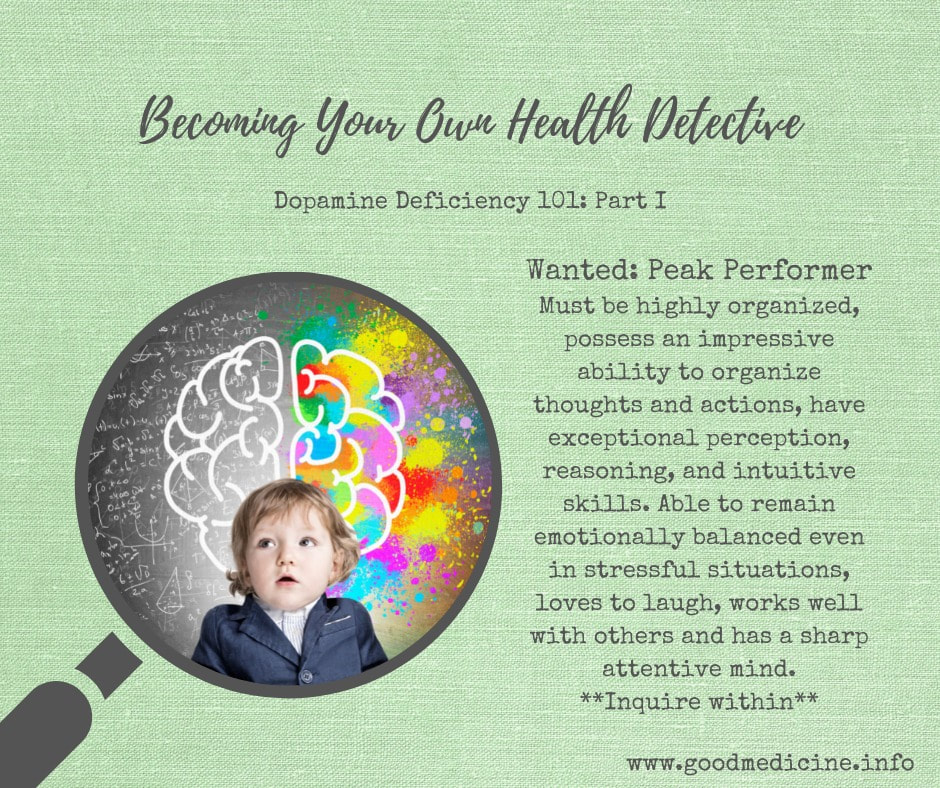Dopamine Deficiency: Part I
“Motivator molecule.”
“Feel good brain juice”
“Reward chemical”
Dopamine is all those things and more. It’s a “VIP” neurotransmitter produced within the body whose job description is critical for optimal brain and body function. While dopamine occupies less than 1% of the neuron real estate in the brain, it is a key ingredient for important and finely tuned tasks:
*Controls flow of information within the brain
*Holds a critical role in memory, attention, and problem solving
*Contributes to motor skills and cognitive abilities
*Plays a supportive role in reproduction
*Activates reward and pleasure centers in the brain
*Holds a key role in attention and learning
*Reduces insulin levels in the body
*Protects the digestive system
*Influences the immune system
*Strongly affects mood and emotions
Dopamine is one of the most widely studied neurotransmitters, and yet there is still so much to discover. There is no direct way to measure levels of dopamine in the brain, so healthcare professionals must evaluate clues just like we are about to do: symptoms, lifestyle habits, medical and medication history are all important factors in becoming aware of what a dopamine deficiency might look like. I often wonder how we operate as we do, given the millions of things that can go wrong in the human body. Thankfully, God designed each body with the incredible ability to restore balance if given the correct tools and time to do so.
Do you remember how easily the gut can be brought out of balance with a pesky virus or an overpopulation of an aggressive bacteria or fungi? The same is true with dopamine. Incrementally small swings of dopamine can make a big impact in either direction. Too much dopamine can lead to some pretty challenging mental health disorders. Dopamine deficiency can be mild or it can be major. Major dopamine deficiency is linked to Parkinson’s, schizophrenia, autism, ADHD, major depressive disorder, certain neurodegenerative disorders, and addictions. Identifying a dopamine deficiency trend early on allows for the time and tools to assist in bringing the body back into balance. I’ll wager that some of these clues may surprise you:
🔎Struggle to handle stress well (often leading to feelings of hopelessness and low self esteem)
🔎Carbohydrate and sugar cravings
🔎Chronic back pain
🔎Persistent constipation
🔎Poor blood sugar stability
🔎Weight fluctuations
🔎Lack of motivation (may show up as learning difficulties)
🔎Impulsiveness (Alleviates feelings of loneliness and sadness. Self gratification is used to “force” a dopamine drop that ultimately only creates more depletion long term.
🔎Difficulty organizing thoughts or staying productive
🔎Difficulty swallowing (dysphagia)
🔎Restless legs
🔎Tremor in the hands
🔎Cold hands or feet
🔎Fatigue or low energy
🔎Attention difficulties (may include a diagnosis of ADD/ ADHD)
🔎Reduced libido
🔎Low moods / depression
🔎Muscle cramps, spasms, or tremors
🔎Stiffness, aches or pains that have no cause
🔎GERD
🔎Lack of insight or self awareness
How does a dopamine deficiency happen? Three possibilities exist: too little dopamine is being made, dopamine receptors are being hindered or are not available in the numbers needed, or dopamine is being broken down before it can be utilized. Neurotransmitters are just as much a product of the environment as the body is. Environment includes mindset, lifestyle, and habitual behavior. Dopamine deficiency is very much affected by all three:
❓Sleep deprivation (Are you using all your tools and knowledge to get a restful night of sleep? (Immupro, Sleep Essence, lavender, cedarwood, Peace & Calming, Rutavala, and Tranquil are great options.)
❓Adrenal fatigue (Do your adrenal glands need some supportive Endoflex or Endogize?)
❓Vitamin B6 or B3 deficiency (Are you taking Super B?)
❓Heavy metal exposure including lead, arsenic, cadmium, and aluminum. Mainstream cosmetics are a hidden contributor to daily heavy metal exposure. Lipstick is among the worst offenders. YL’s Savvy Minerals cosmetics line has many gorgeous, long lasting colors to choose from that are toxin free and dopamine friendly!
❓C Difficile overgrowth. This is often the result of antibiotic use. Always follow each antibiotic dose two hours later with a probiotic such as Life 9 or MightyPro and fermented foods to minimize risk of this occurrence.
❓Low magnesium, zinc, iron (Get proper lab work. Know your numbers, and supplement if necessary!)
❓Vitamin C deficiency (Are you taking your Super C Chewables?)
❓Vitamin D deficiency (Know your numbers and supplement with Super D or something stronger if your labs reflect the need.)
❓Obesity. This causes a downregulation of dopamine in the brain, and leads to a reduction of the number of receptors in the brain.
❓Drug abuse both depletes dopamine and reduces the number of receptors in the brain.
❓Diets high in saturated fats and sugar ultimately deplete dopamine resources.
❓Chronic stress affects the body’s ability to produce dopamine. Go back and review the section on stress for tips, tricks and habits to mitigate stress wisely.
❓Certain medications often have a disastrous effect on dopamine in the body.
The topic of medications and their effects on dopamine is so very important and unfortunately it is rarely discussed. I’ll devote next week’s post to that discussion! Life is too short to feel “meh” and live in jammies. If you’ve identified any areas of life that may be sabotaging your dopamine production or utilization, it’s always a great time to make some changes and invest in yourself!
xoxo~ liz
www.goodmedicine.info
#Sharingiscaring
#ahealthydopaminelevelisgoodmedicine
#BecomingYourOwnHealthDetective
#ThanksYL
#goodmedicine

